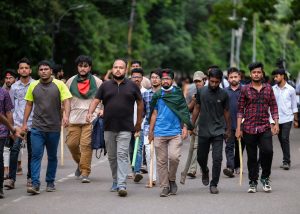In recent years, political movements led by established opposition parties like the Bangladesh Nationalist Party (BNP) and Jamaat-e-Islami (JI) have lost their effectiveness in Bangladesh. Although these parties have long claimed to champion democracy, they have struggled to gain traction, especially among the middle class and youth, who are increasingly disillusioned with traditional politics.
Despite facing severe repression over the past decade and a half, the BNP and JI haven’t managed to mount a significant challenge to the Awami League’s authoritarian rule. The government’s development narrative obscured the civic disrespect endured by ordinary Bangladeshis, particularly those aligned with opposition groups.
Interestingly, the success that BNP and JI sought did not come from their own efforts but from an unexpected source: a student-led social movement. The July-August 2024 Anti-discrimination Students Movement achieved what these established political forces could not: driving Prime Minister Sheikh Hasina and the Awami League out of power.
One of the most compelling aspects of this student movement was its ability to bridge political and ideological divides, bringing together people from various backgrounds – left, right, or centrist – under a common cause. The slogan “Who are you? Who am I? Razakar! Razakar! Who said so? Who said so? Dictator! Dictator!” symbolized this inclusivity. (“Razakars” were collaborators with the Pakistani army during the 1971 Bangladesh Liberation War; the term has long been used as a pejorative.)
This slogan carries several layers of significance. First, by challenging the Razakar vs. non-Razakar divide, it eased the concerns of “non-political” citizens who feared marginalization if they joined the movement. Second, it created a safe space for organized political forces opposed to the government, garnering substantial moral and political support from a broad segment of the population – a crucial strategic advantage. Third, by labeling the head of government as a dictator, it validated the longstanding demands of parties like the BNP and JI, reinforcing their claims. Thus, the student movement provided a rare opportunity for opposition parties to participate – if only covertly – in a larger campaign for justice and political change. However, their reluctance to fully emerge from the shadows revealed deeper flaws in their political strategies.
Despite their years of suffering and desire to overthrow the regime, the BNP and JI were hesitant to publicly align themselves with the movement. Their political agency, long diminished by being branded as anti-state, wasn’t revived by the student movement’s language. While the slogan helped students navigate the binary narrative, it didn’t offer the same protection to opposition parties.
This situation highlights a critical flaw in the political strategy in Bangladesh. Although the student protest movement created a rare opportunity for a broad coalition, opposition parties like the BNP and JI were too mired in past failures to effectively seize it. If they had managed to shed their past baggage and engage openly, they might have played a more prominent role.
Nevertheless, their covert involvement was still significant. Despite its momentum and public support, the Anti-Discrimination Students Movement might not have succeeded without the groundwork laid by the opposition’s long history of repression and sacrifice. The students’ resistance against authoritarianism drew strength from this history, showing that the foundation laid by the BNP and JI was crucial for the movement’s resonance with the public.
The student movement’s success wasn’t solely due to its slogans or leadership but also a response to the political disillusionment caused by years of authoritarian rule. The real question is why established political parties couldn’t achieve this themselves. The answer lies in a crisis of political trust. The BNP’s and JI’s past failure to maintain a clean political image meant they couldn’t inspire the trust needed for mass mobilization.
This trust deficit was evident when the BNP boycotted the flawed 2014 and 2024 elections and participated in the rigged 2018 election. In all cases, the public remained largely indifferent to the electoral oppression, even amid crises like inflation, corruption, and authoritarian control. Yet when students were killed or arrested during the anti-discrimination movement, the public responded with deep empathy. The key difference was the perceived innocence of the students, who were seen as non-political actors standing against injustice, unlike the BNP or JI, whose actions were tainted by years of political maneuvering.
The public disillusionment with established political parties is perhaps the most important takeaway from the student movement’s success. It shows that political movements in Bangladesh can no longer rely solely on democratic or anti-authoritarian rhetoric. They must rebuild trust by creating genuinely inclusive political spaces free from past mistakes. The student movement succeeded largely because it wasn’t burdened by past failures, and that, more than any slogan, was its true strength.
In the wake of Sheikh Hasina’s resignation, political actors in Bangladesh must learn from this. The public is willing to support causes that seem pure and just, but this support requires real accountability. The BNP’s and JI’s role in the movement was crucial, but their failure to lead reflects a broader crisis in political leadership. The student movement’s success came not from a new political language but from tapping into a collective desire for change that transcended traditional party politics.
As Bangladesh moves forward, the lesson for all political actors is clear: The future of political mobilization will depend on trust, accountability, and the ability to build genuine, inclusive movements unburdened by past failures. If parties like the BNP and JI fail to adapt, they risk being left behind by a population eager for new leadership. The student movement’s real strength lay in its ability to inspire this trust, offering a roadmap for future political engagement in a nation yearning for authentic democratic change.

































